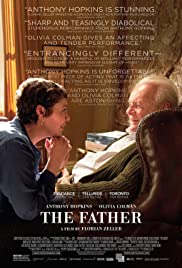
THE FATHER
UK/ France, 2020, 97 minutes, Colour.
Anthony Hopkins, Olivia Colman, Olivia Williams, Rufus Sewell, Mark Gattis, Imogen Poots.
Directed by Florian Zeller.
Bewilderment. That might be the key word for appreciating this powerful cinema experience. It is the bewilderment experienced by the elderly Anthony. It is the bewilderment that the screenplay skilfully exercises on the audience, making them share in upsetting and mystifying experiences with Anthony.
The film was directed by the French writer-actor-director, Florian Zeller. And the screenplay is based on his play, collaborating for the screen with the veteran playwright and screenwriter, Christopher Hampton (Dangerous Liaisons, A Dangerous Method, Cheri). As the audience experiences the film, we come to realise how intricately clever the screenplay is.
But, it is brought to the screen by Anthony Hopkins in one of his greatest performances (and that is saying something). His character announces that he was born in December 1937 – and that is the date of Hopkins own birth. Which means that he is acting a man his age, but playing a man who is not able to act his own age. Hopkins plays with great subtlety, often quiet, sometimes bombastic, seemingly sure of himself, then becoming, that keyword, bewildered.
The setting is London. Anthony is seen living in his quite comfortable flat. He is visited by his daughter, Anne (another quite different performance from Olivia Colman, The Crown as Queen Elizabeth, Oscar Winner for The Favourite as Queen Anne) is middle-aged, divorced, looks after her father, bringing in food, cooking for him. However, she has met someone, Paul (Rufus Sewell) and is planning to move to Paris with him. Anthony objects, repeating several times of the don’t speak English in Paris.
And, then we the audience become bewildered because suddenly Anne appears again, bringing chicken for a meal, but she is played by Olivia Williams. So, who is the real Anne? And further complications because Anthony suddenly finds a man sitting in his flat, reading the paper, telling him that he lives there, that he is Paul (Mark Gattis).
And, there are further complications. Anthony has been asserting his independence. He doesn’t need a carer – and picks quarrels with them, dismissing them. However, Anne introduces him to a young carer, Imogen Poots, Laura, who momentarily gets on with him but then he taunts her and humiliates her. She does come back, trying to do her best.
And then, the layout of the flat and its pictures change, and it is Anne’s flat was mysterious corridors and doors.
We realise that we are being invited to share the experience of ageing, of possibilities of dementia, of possibilities of Alzheimer’s, experiences of senility and the consequent bewilderment.
While there have been some powerful portrayals of ageing and mental and emotional confusion on screen, The Father can be wholeheartedly recommended.
1. The impact of the film? Anthony Hopkins’ presence and performance? The emergence of the audience in the plot, in Anthony’s bewilderment, shifting perspectives of mind and imagination and memory?
2. The original as a play, the writer as co-writer of the film, directing the film?
3. The London setting, the interiors of the flats, of the institution for the elderly? Rooms, corridors? The musical score? The classical themes? Anthony listening to the music?
4. The title, the focus on Anthony, his relationship with Anne, the memories of his daughter, Lucy, the revelation of her accident, the glimpse of her in the hospital bed? His role as a father in the past? In the present? His dependence on Anne?
5. A story of dementia, senility? Anthony Hopkins’ skill in presenting Anthony as seemingly normal, in his imagination, in his bewilderment, in his strong stances and demands, and his fantasies? The audience sharing the bewilderment, not knowing exactly what was happening, what was real, Paul in the house reading the paper, the different Anne, the actual Anne and her plans to go to Paris, the real Paul? Laura coming as the helper? The audience gradually being able to differentiate between Anthony’s imagination and the reality?
6. Anthony is a character, Anthony Hopkins’ actual age, his acting his age, but acting his age with mental deterioration? The past as an engineer, his thinking he was a tap dancer, in the circus, elephants? No memories of his wife, confused memory of his daughter Lucy? Demanding, short-tempered, tantrums? Bewilderment in his own flat, in Anne’s flat, in the hospital, the corridors and his opening out indoors? Yet the view from the windows, the park? His treatment of others, sharp comments, his criticisms of Laura? Antagonism towards his imagination of Paul? The alternate Anne? His harsh treatment of the real Anne?
7. Anne, a character and personality, devotion to her father, visiting his flat, his staying in? The past and her divorce? A relationship with Paul? The plan to go to Paris? Anthony’s criticism, the repetition that they don’t speak English in Paris? The devotion, shopping and cooking, discussions with him? The detailed scenes of seeing Anne and all the domestic work? At home?
8. Paul, the real Paul, relationship with Anne, discussions with her, the Paris plans, some of his sharp remarks and demands on Anthony?
9. The alternate Paul, sitting in the house, sharp remarks, the slaps? And the revelation that he was the orderly in hospital?
10. The alternate Anne, repeating the words of the real Anne, the shopping, cooking, relationships? The discovery that she was the carer in the hospital, her manner as carer, the discussions with Anthony, explaining things to him?
11. Anthony, his physical health, his mental health, discussions with the doctors?
12. The symbolism of his looking at the window, the boy playing with the ball (performed by the director son)?
13. The final image of his looking at the window, the park and the trees?
14. The impact of the drama, the performance, the supporting cast, an exploration of themes of ageing, immersing the audience in some of the mental and imagination aspects of ageing?